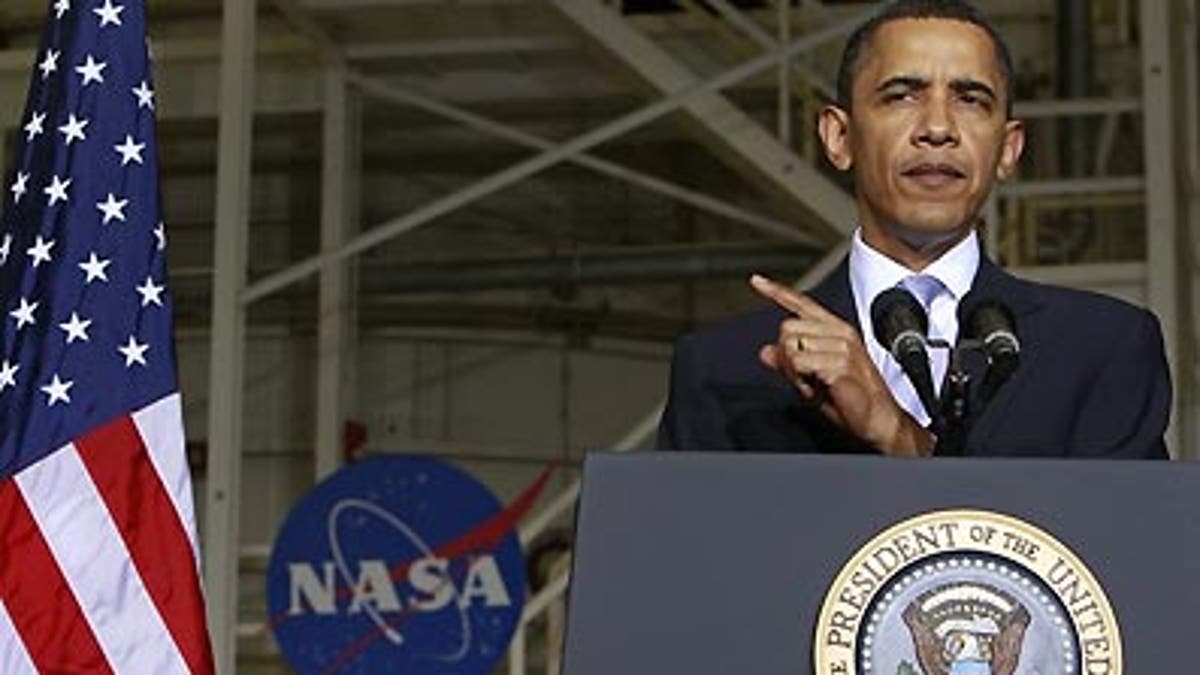
Reuters
President Obama, with his speech on Thursday, seems to have heard and acted on some of the criticism of his controversial February budget proposal for NASA. He had proposed then to shift the nation’s astronaut access to orbit to commercial rockets and spacecraft, and cancelled NASA’s Constellation program to return astronauts to the moon and deep space.
On Thursday, he attempted to refute claims that these shifts marked a strategic retreat from U.S. leadership in space. He stated his clear support for human space voyages to nearby asteroids, to the moons of Mars, and eventually to the surface of Mars itself. He promised to decide in 2015 on the design for a new heavy lift rocket, the booster that would then send U.S. astronauts to those deep space destinations. He also revamped Constellation’s Orion spacecraft, meant for lunar voyages, as an emergency lifeboat to be berthed at the International Space Station.
These commitments to a vigorous space exploration program are all to the good. But the president’s budget speaks louder than his words. His extra $6 billion for NASA over the next five years does little more than pace inflation, and cannot fund both the revised Orion spacecraft, the “bold” research to enable deep space travel, “breakthrough” propulsion systems, and a realistic program to send humans into deep space. His lack of a firm schedule and proposed funds for these achievements (an asteroid mission would not occur before 2025) means that his NASA vision has little chance of becoming reality.
After the shuttle retires later this year, NASA will have no route to the ISS other than rented seats on Russian rockets, at $55 million per seat. The nation will have to wait until commercial companies, with no record of yet launching a single new human-rated rocket or spacecraft, learn the lessons NASA has accumulated during 50 years of spaceflight experience. There is no backup system in case of the commercial firms’ failure. Worst of all, NASA’s unmatched team of spaceflight experts will disperse after the shuttle retires—there will be no work for them. Will we ever see such a team, with its knowledge and spirit, challenging the space frontier again?
Without a schedule to leave Earth orbit behind, and funds to match, that talent pool will rapidly drain away. Neil Armstrong and other veteran astronauts and flight directors conclude that our nation will quickly become an also-ran in space, with no better capabilities on the frontier than Russia, China, or India.
Last year the U.S. had a proven spacecraft in the shuttle, and a well-defined plan for sending American astronauts to deep space. Next year we will have no spacecraft, and no credible plan to develop our own deep space craft for a decade or more. Our experienced NASA team will have left for jobs elsewhere—if they can find them. Our claims for space leadership will be believed only by the president’s speechwriters.
Success in rocket science, in exploration, demands real-world skill, adequate resources, and vigorous leadership. Certainly we can afford the 0.7% of the federal budget necessary to retain global leadership in human spaceflight. The extra $3 billion per year that the president’s own expert panel recommended for NASA would be a continuing stimulus to our high-tech work force, and an inspiration to our brightest young people, who won’t wait decades to decide on careers in science and engineering.
The Congress should correct the president’s short-sighted course and give NASA an ambitious exploration goal and schedule. It should provide the necessary funding to assure our access to space, then send American explorers to deep space destinations within a decade. By renewing our commitment to demonstrated leadership in space, we will continue to reap the economic, technological, and scientific rewards of exploration on the high frontier.
Tom Jones is a four-time shuttle astronaut, planetary scientist, consultant, author, speaker and Fox News contributor. His latest book is Planetology: Unlocking the Secrets of the Solar System. For more visit: www.AstronautTomJones.com.
Fox Forum is on Twitter. Follow us @fxnopinion.








































